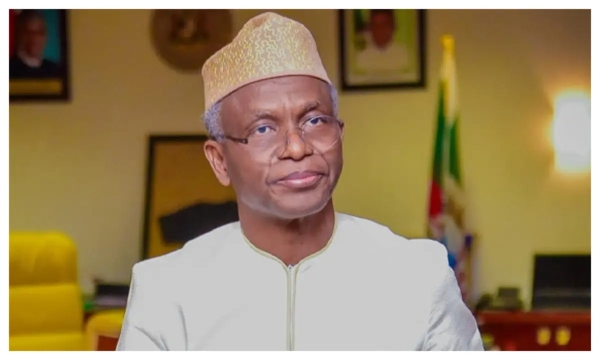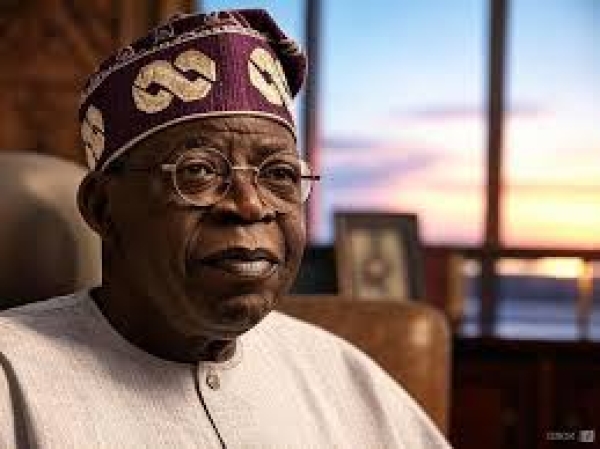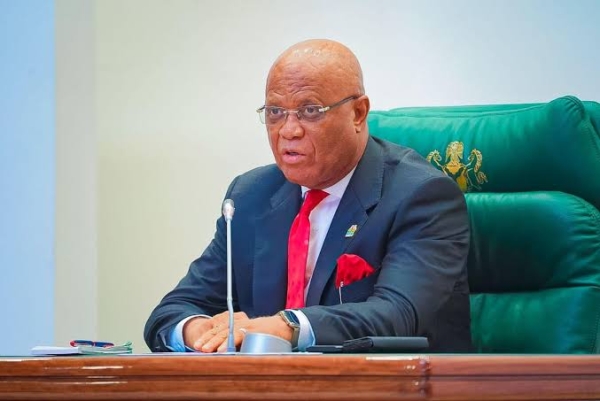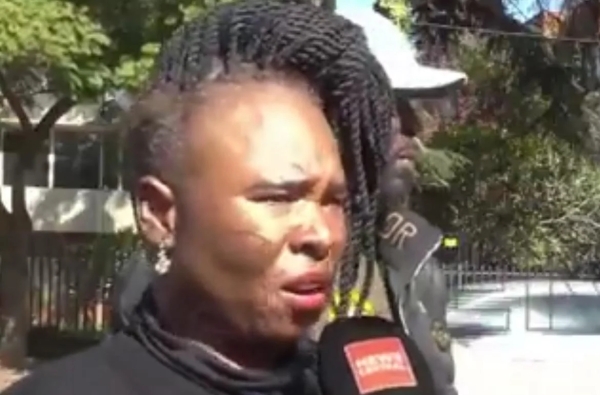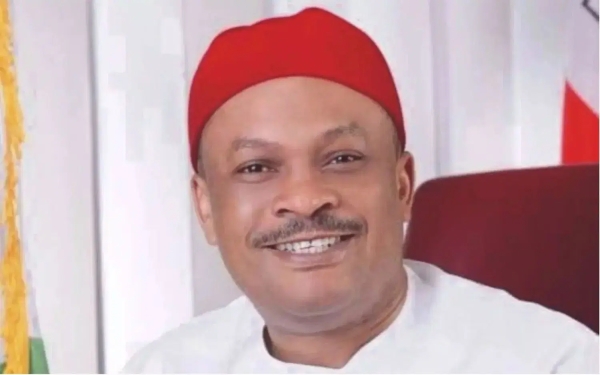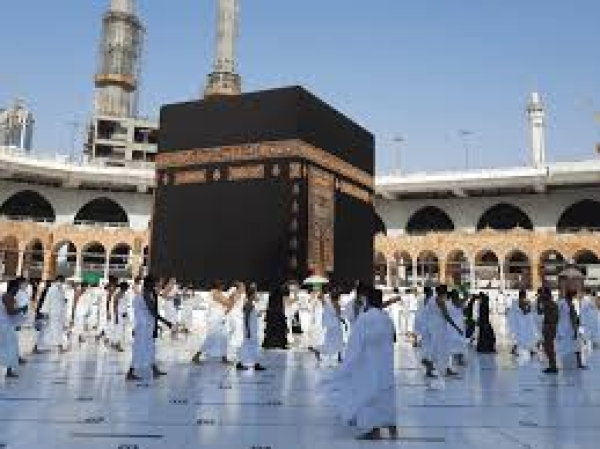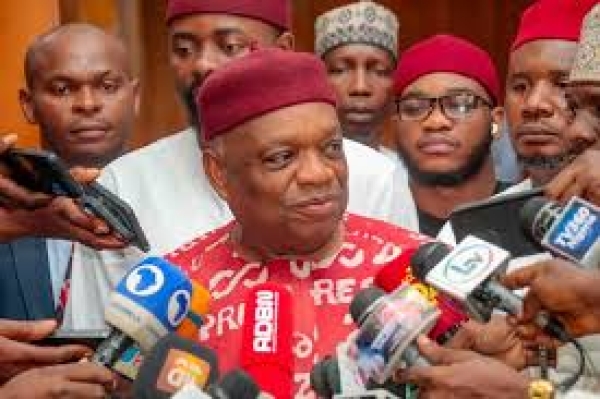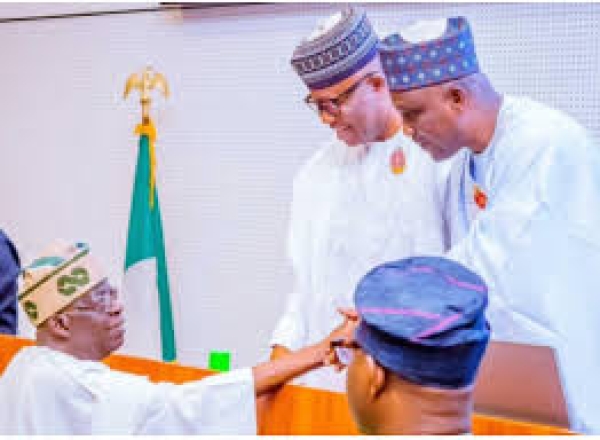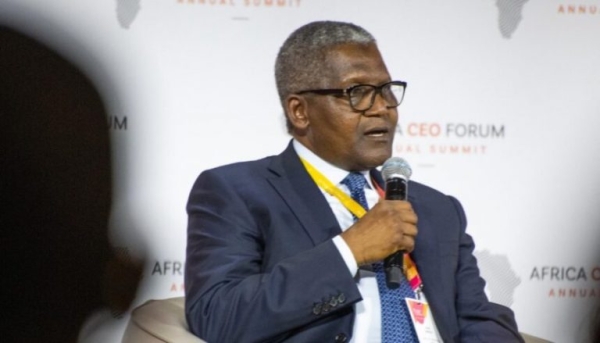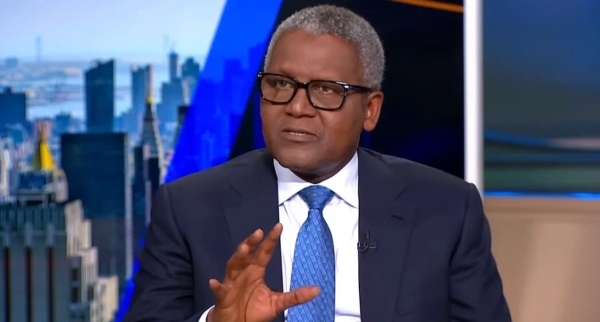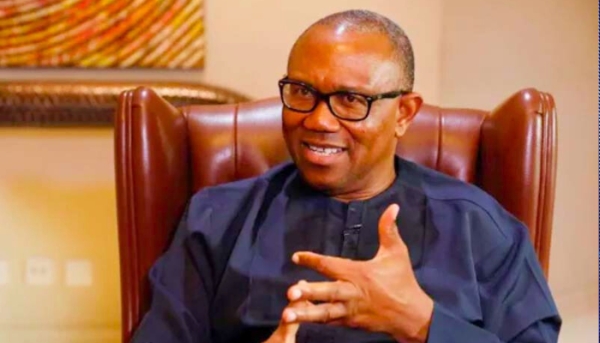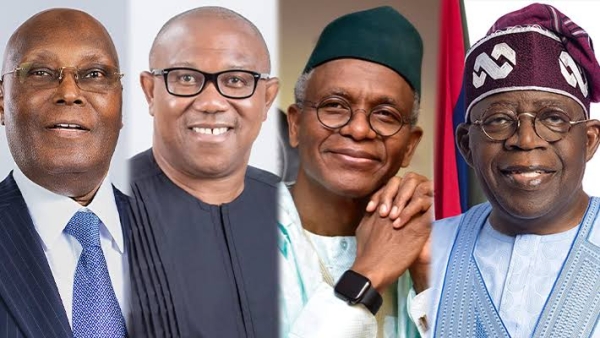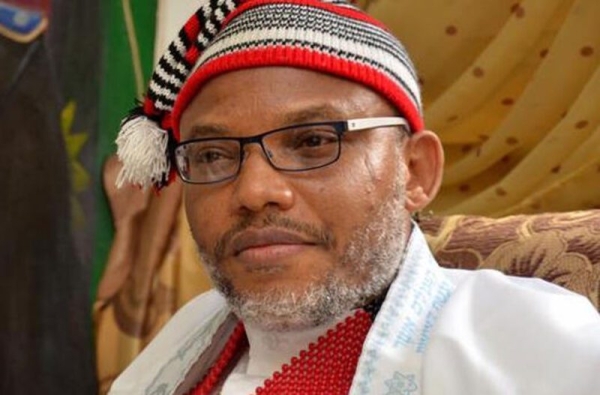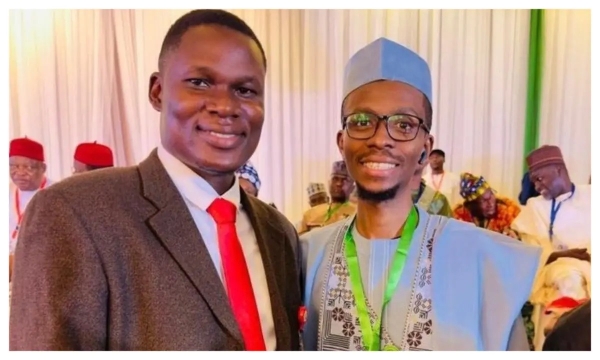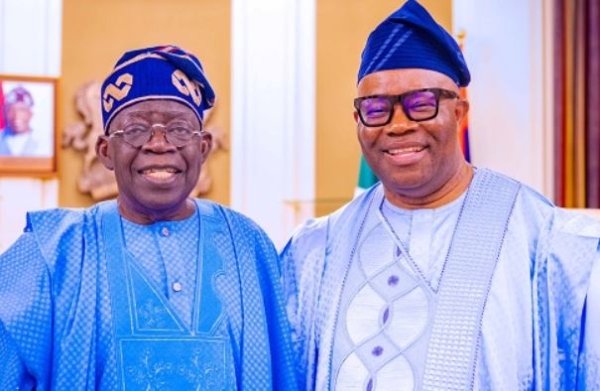TOP NEWS
Reuben's View
Latest News
Search
MOST READ
-
2027: El-Rufai explains why reelecting Tinubu is impossible
-
Tinubu-led APC plotting one-party state over fear of defeat in 2027 - PDP
-
APC Lauds Gov Eno’s SUV Donation To Party Chairman
-
Wife of Nigerian man killed in South Africa renounces citizenship, seeks justice
-
PDP NEC under pressure as INEC validates Wike-backed secretary
-
Saudi Supreme Court confirms Arafat Day on June 5, Eid Al-Adha on June 6
-
Alleged Abuja Land Fraud: Court orders arrest of FCTA Director, 11 others
-
‘Nigerians are used to easy money,’ Orji Kalu defends Tinubu’s economic reforms
-
Top 10 courses to study in Finland for high employment opportunities
-
Nigeria’s debt heads for N180trn as Tinubu seeks N34trn new loans
-
Remember You Are Not Taking Money To Grave – Dangote To Politicians
767 times -
‘African Giant Burna Boy is dead’ – Singer says
730 times -
FG makes 52 kobo from every N1 generated by my cement company - Dangote
692 times -
2027: Peter Obi moving quietly, having underground meetings to unseat Tinubu – Adebayo
661 times -
Tinubu Going Back to Lagos – El-Rufai Confirms Atiku, Obi 2027 Deal
550 times -
“I Will Strike Out Your Case” — Judge Warns FG Over Delays in Nnamdi Kanu’s Trial
543 times -
El-Rufai’s son, Bello abandons father, SDP, backs Tinubu for second term
539 times -
Atiku, Sambo Meets Tinubu’s Ex-ally, Rauf Aregbesola
485 times -
Again, Dangote Refinery Slashes Petrol Price Nationwide
479 times -
Tinubu should be Nigeria’s sole presidential candidate in 2027, says Akpabio
477 times








![[OPINION] Octopus Wike And The PDP - Reuben Abati [OPINION] Octopus Wike And The PDP - Reuben Abati](https://reubenabati.com.ng/cache/mod_bt_contentslider/199cf8910c41b2b56d33e3d5e66c8649-0c132d1dd795979de9db14cc333bbe4d_XL.jpg)
![[OPINION] Zulum And The Surge In Insurgency - Reuben Abati [OPINION] Zulum And The Surge In Insurgency - Reuben Abati](https://reubenabati.com.ng/cache/mod_bt_contentslider/ad6e52c43f66e3cf537b06ad38aa93b6-8ac05a2894b5e82aeee611e792497153_XL.jpg)
![[OPINION] Defections And Threat Of One-Party State - Reuben Abati [OPINION] Defections And Threat Of One-Party State - Reuben Abati](https://reubenabati.com.ng/cache/mod_bt_contentslider/e16351efb50f01266cc28b7377bd5e83-90b1922af682fff68852fa7fab5a4331_XL.jpg)
![[OPINION] Pope Trump, Adebanjo And Other Stories - Reuben Abati [OPINION] Pope Trump, Adebanjo And Other Stories - Reuben Abati](https://reubenabati.com.ng/cache/mod_bt_contentslider/a9c28326249471b0c6d135375d9aa6d3-66656381f38ceca0faf1a84f4c1885dd_XL.jpg)
![[OPINION] CBEX Wealth Chasers, NDIC And The Fate Of Depositors - Reuben Abati [OPINION] CBEX Wealth Chasers, NDIC And The Fate Of Depositors - Reuben Abati](https://reubenabati.com.ng/cache/mod_bt_contentslider/e7c29125e793371f688b9def0c150948-867aa1263f279020e1b930969b024a70_XL.jpg)
![[OPINION] Pope Francis (1936 – 2025) - Reuben Abati [OPINION] Pope Francis (1936 – 2025) - Reuben Abati](https://reubenabati.com.ng/cache/mod_bt_contentslider/9df20a858100040a45e2fc6915d65f41-c0395aa98d8919afead20f020215aa2b_XL.jpg)
![[OPINION] Plateau, Tsiga and Trump - Reuben Abati [OPINION] Plateau, Tsiga and Trump - Reuben Abati](https://reubenabati.com.ng/cache/mod_bt_contentslider/d4ff657a4976c08f133a5993db7ca3de-076f7f795e47e1dc74a28ca93d3c698e_XL.jpg)
![[OPINION] The Uromi 16 And The Problem With Nigeria - Reuben Abati [OPINION] The Uromi 16 And The Problem With Nigeria - Reuben Abati](https://reubenabati.com.ng/cache/mod_bt_contentslider/848d0c6943c9a9cb7639e8f5640d2cbf-4b585f7414a3fc875b761851d4c5fcd4_XL.jpg)
![[OPINION] Breakfast With The Soludos - Reuben Abati [OPINION] Breakfast With The Soludos - Reuben Abati](https://reubenabati.com.ng/cache/mod_bt_contentslider/a98b5c30f61dcb10378fdba9f5e472ab-33b747862875f50d863e709f5955da5d_XL.jpg)
![[OPINION] The Emerging Coalition Against Tinubu/APC - Reuben Abati [OPINION] The Emerging Coalition Against Tinubu/APC - Reuben Abati](https://reubenabati.com.ng/cache/mod_bt_contentslider/ddd6416fbaa008a5bcbc568f0e3c8857-02972c9f0dee40a6ad85830afbb49758_XL.jpg)
![[OPINION] Nasir El-Rufai’s Defections: PDP, CPC, APC, SDP - Reuben Abati [OPINION] Nasir El-Rufai’s Defections: PDP, CPC, APC, SDP - Reuben Abati](https://reubenabati.com.ng/cache/mod_bt_contentslider/817d1e0c4d951b18f15f406968204870-61d46cc1859ac5d4f70406214a7d7e4f_XL.jpg)
![[OPINION] A World Of Godfathers - Reuben Abati [OPINION] A World Of Godfathers - Reuben Abati](https://reubenabati.com.ng/cache/mod_bt_contentslider/f282a08e8e116be2577cc430882505bc-6d66582218d28730d47a7b9a32e18004_XL.jpg)







![[OPINION] A rock and a hard place - Hakeem Baba-Ahmed](https://reubenabati.com.ng/media/k2/items/cache/7dcbbc490ba9391c1307c413d8c448ce_XL.jpg?t=-62169984000)

![[OPINION] The PDP secretariat saga and matters arising - Olanrewaju Osho](https://reubenabati.com.ng/media/k2/items/cache/77236527a4ffc270bf1127b3a858c1c7_XL.jpg?t=-62169984000)

![[OPINION] Tinubu’s half-time score card - Bola Bolawole](https://reubenabati.com.ng/media/k2/items/cache/6b42fa95c2d94b645c67703d9e07dd2d_XL.jpg?t=-62169984000)


































![[OPINION] A rock and a hard place - Hakeem Baba-Ahmed [OPINION] A rock and a hard place - Hakeem Baba-Ahmed](https://reubenabati.com.ng/cache/mod_bt_contentslider/86c9f7079455895ef9286c9a93b538ed-7dcbbc490ba9391c1307c413d8c448ce_XL.jpg)

![[OPINION] The PDP secretariat saga and matters arising - Olanrewaju Osho [OPINION] The PDP secretariat saga and matters arising - Olanrewaju Osho](https://reubenabati.com.ng/cache/mod_bt_contentslider/d61088b46fb675714e7295455854212f-77236527a4ffc270bf1127b3a858c1c7_XL.jpg)

![[OPINION] Tinubu’s half-time score card - Bola Bolawole [OPINION] Tinubu’s half-time score card - Bola Bolawole](https://reubenabati.com.ng/cache/mod_bt_contentslider/a7f51b34d9e30db82048a748cd30634f-6b42fa95c2d94b645c67703d9e07dd2d_XL.jpg)

































![[OPINION] IBB’s A Journey In Service: A Substantive Response - Kola Abiola [OPINION] IBB’s A Journey In Service: A Substantive Response - Kola Abiola](https://reubenabati.com.ng/cache/mod_bt_contentslider/0c4c4a5ec297202c0a5baeea27b69686-85dc2597b3eda3036fffd3638fa862b4_XL.jpg)













![[OPINION] Nigeria’s ruling elite and state capture - Jide Ojo [OPINION] Nigeria’s ruling elite and state capture - Jide Ojo](https://reubenabati.com.ng/cache/mod_bt_contentslider/6daeb21487ebda97b6c5d40a7250323e-ef7fe6e3f39af77abca1fff58ec0e51c_XL.jpg)
![[OPINION] That security vote of governors - Lekan Sote [OPINION] That security vote of governors - Lekan Sote](https://reubenabati.com.ng/cache/mod_bt_contentslider/20f12e57e394757dff6fd297b1748bbd-9b47769d5bcb7bc873e512b831bf58b5_XL.jpg)
![[OPINION] My Country, Right or Wrong, Mentality is Actually Unpatriotic: A Dialogue with Fashola - Babafemi A. Badejo [OPINION] My Country, Right or Wrong, Mentality is Actually Unpatriotic: A Dialogue with Fashola - Babafemi A. Badejo](https://reubenabati.com.ng/cache/mod_bt_contentslider/ee56e03f0362e4f7634aedd29f82fec0-eb2c91a82c8a7d67299a6054990114d7_XL.jpg)















![[PRESS RELEASE] Path To Birthing Future Civil Service - Olaopa [PRESS RELEASE] Path To Birthing Future Civil Service - Olaopa](https://reubenabati.com.ng/cache/mod_bt_contentslider/2eb53efd9f8a9f95be2b804fb198dbe5-4d4484e8c4f3d280f2fc95e7cad5ce15_XL.jpg)
![[OPINION] Octopus Wike And The PDP - Reuben Abati [OPINION] Octopus Wike And The PDP - Reuben Abati](https://reubenabati.com.ng/cache/mod_bt_contentslider/06b70bc4019f1d5c0ffbd868d105f8e5-0c132d1dd795979de9db14cc333bbe4d_XL.jpg)

![[OPINION] Is an Atiku Abubakar/Peter Obi Presidency Not Too Late? - Magnus Onyibe [OPINION] Is an Atiku Abubakar/Peter Obi Presidency Not Too Late? - Magnus Onyibe](https://reubenabati.com.ng/cache/mod_bt_contentslider/ccdca917fd08bcdf40c3bb83ea257a3b-777bb5640652d7f814ca85e6665c06bb_XL.jpg)





![[OPINION] Akpabio, Abbas reenact Abacha style for Tinubu - Azuka Onwuka [OPINION] Akpabio, Abbas reenact Abacha style for Tinubu - Azuka Onwuka](https://reubenabati.com.ng/cache/mod_bt_contentslider/d67e947b1a7499f6fb897f86649a43f6-73e5cbc10e0f803e54f2db012a1a586c_XL.jpg)

![[OPINION] Constitution made in a hurry, made in error - Eric Teniola [OPINION] Constitution made in a hurry, made in error - Eric Teniola](https://reubenabati.com.ng/cache/mod_bt_contentslider/2d8319c5c77624ff9e756581d9b2fe05-0b98a900c8e8d5ea2b203ed41f93bd71_XL.jpg)


![[OPINION] Crusading for Emefiele - Jide Oluwajuyitan [OPINION] Crusading for Emefiele - Jide Oluwajuyitan](https://reubenabati.com.ng/cache/mod_bt_contentslider/17fa23f50875165312a0b05d133ba048-ee71df59ada8657e832eebbdef4498ce_XL.jpg)







![[OPINION] The Nigerian Child as Endangered Species - Onikepo Braithwaite [OPINION] The Nigerian Child as Endangered Species - Onikepo Braithwaite](https://reubenabati.com.ng/cache/mod_bt_contentslider/5c0e0b751ca2858d47584e05dd66f9a8-0394f7c2cd4cc51310819140650d3895_XL.jpg)




















